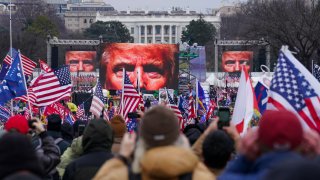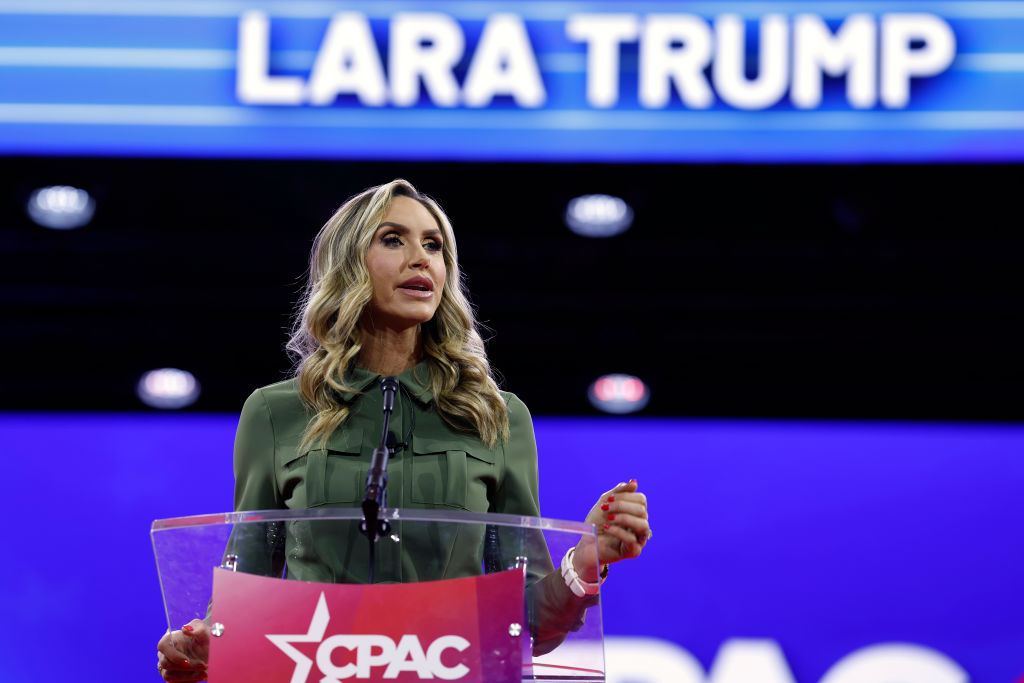
A panel of judges on Tuesday questioned whether they had the authority to grant former President Donald Trump's demands and stop the White House from allowing the release of documents related to the Jan. 6 insurrection led by Trump's supporters.
But the judges also noted that there may be times when a former president would be justified in trying to stop the incumbent from disclosing records.
The U.S. Court of Appeals for the District of Columbia Circuit heard arguments from lawyers for Trump and the House committee seeking the records as part of its investigation into the Capitol riot. Trump’s attorneys want the court to reverse a federal judge’s ruling allowing the National Archives and Records Administration to turn over the records after President Joe Biden waived executive privilege.
Trump supporters broke into the Capitol on Jan. 6 after a rally near the White House where he made false claims of election fraud and challenged them to “fight like hell." About 700 people have been federally charged. Nine people died during and after the rioting.
The National Archives has said that the records Trump wants to block include presidential diaries, visitor logs, speech drafts, handwritten notes “concerning the events of January 6” from the files of former chief of staff Mark Meadows, and “a draft Executive Order on the topic of election integrity.”
Compared to U.S. District Judge Tanya Chutkan, whose ruling Trump is contesting, the three judges on the appeals court spent relatively little time weighing the importance of the documents themselves. They instead focused most of the hearing Tuesday on what role federal courts should have when an incumbent president and former president are at odds over records from the former's administration.
The judges sharply questioned both sides and challenged them with hypothetical scenarios.
U.S. & World
To Trump's lawyers, Judge Patricia Millett suggested a situation where a current president negotiating with a foreign leader needed to know what promises a former president had made to that leader. The incumbent might seek to release a transcript of a phone call or other records from the previous administration for national security reasons, the judge said.
“To be clear, your position is a former president could come in and file a lawsuit?” Millett said. Trump lawyer Justin Clark responded, “That is our position.”
Feeling out of the loop? We'll catch you up on the Chicago news you need to know. Sign up for the weekly> Chicago Catch-Up newsletter.
To a lawyer for the House committee, Millett raised a scenario where a newly elected president might seek retribution against a disliked predecessor. The new president and a Congress led by the same party might declare that there was a national security interest in releasing all of the former president's records, even at the risk of endangering people's lives, she said.
“Needless to say, the former president comes to court, (says), 'Hang on,'" Millett said. "What happens?”
She did not say she was referring to any president and rejected committee lawyer Douglas Letter's response referencing a president who “fomented an insurrection.”
“We're not going to make it that easy,” she said.
Letter argued the determination of a current president should outweigh predecessors in almost all circumstances and noted that both Biden and Congress were in agreement that the Jan. 6 records should be turned over.
“It would be astonishing for this court to override the current president and Congress,” Letter said.
Democratic presidents nominated all three judges who heard arguments Tuesday. Millett and Judge Robert Wilkins were nominated by former President Barack Obama. Judge Ketanji Brown Jackson is a Biden appointee seen as a contender for a Supreme Court seat should one open during the current administration.
Jackson said Tuesday that she questioned whether judges should intervene in a dispute where the executive and legislative branches agree but a former president doesn't.
“The court swooping in to do some sort of balancing test ... actually raises its own separation of powers concerns in terms of the power of the court to resolve or to second-guess what this executive is saying," she said.
Given the stakes of the case, either side is likely to appeal to the Supreme Court.
Despite Trump’s false claims about a stolen election, the results were confirmed by state officials and upheld by courts. The last attorney general appointed by Trump, William Barr, has said the Justice Department found no evidence of widespread fraud.
In explaining why Biden has not shielded Trump’s records, White House counsel Dana Remus has written that they could “shed light on events within the White House on and about January 6 and bear on the Select Committee’s need to understand the facts underlying the most serious attack on the operations of the Federal Government since the Civil War.”
Trump and his allies have fought the committee in court and in Congress by claiming that the former president can still exert executive privilege to prevent cooperation. Their efforts have delayed for months the production of key information to the committee.
Former chief of staff Meadows and former adviser Steve Bannon have resisted efforts by the House panel to obtain documents and question them about possible meetings with Trump before the riot. The Justice Department has indicted Bannon on a contempt of Congress charge. Meadows, seeking to avoid the same, is now cooperating on a limited basis, the committee’s chairman said Tuesday.
In their appeal to the circuit court, Trump’s lawyers said they agreed with Chutkan that presidents were not kings who must not be challenged. “True, but in that same vein, Congress is not Parliament — a legislative body with supreme and unchecked constitutional power over the operations of government,” they wrote.
Trump has argued that records of his deliberations on Jan. 6 must be withheld to protect executive privilege for future presidents and that the Democrat-led House is primarily driven by politics. The House committee’s lawyers rejected those arguments and called Trump’s attempts to assert executive privilege “unprecedented and deeply flawed.”
“It is difficult to imagine a more critical subject for Congressional investigation, and Mr. Trump’s arguments cannot overcome Congress’s pressing need,” the committee’s lawyers said.



